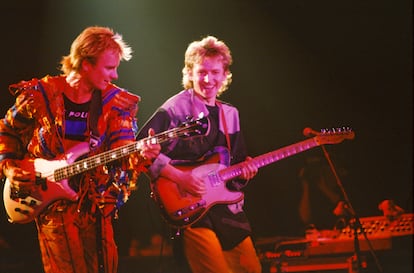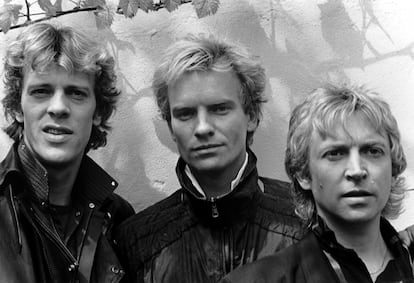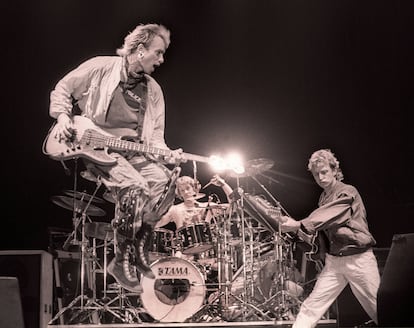‘Synchronicity’: The experimental album that went gold and broke up The Police
The trio’s last project, which included their most popular song, ‘Every Breath You Take,’ is being reissued to celebrate its 40th anniversary

On August 18, 1983, The Police gave a concert at New York’s Shea Stadium in front of 67,000 people, a larger audience than the one The Beatles had in 1965, which was 55,000. There, on stage, the leader of the English trio — bassist and singer Gordon Matthew Sumner (popularly known as Sting) — decided to leave the band.
At the time, they were at their best. The band was presenting its fifth album, Synchronicity, a magnum opus that won three Grammy awards and sold 15 million copies. It included timeless hits such as King of Pain, Synchronicity I and Wrapped Around Your Finger. But above all, the iconic song was Every Breath You Take, one of the most-played songs in history and the only one from the boomer generation to sneak into the 100 most-played songs on Spotify, alongside those by contemporary stars such as The Weeknd, Harry Styles, Dua Lipa or Post Malone.
In a telephone conversation with EL PAÍS, 81-year-old Andy Summers, the British rock band’s guitarist, sums up the story from his home in Los Angeles: “We were a unique band and the sound came from the chemistry of three very different people. It’s incredible when something like that happens. And it doesn’t happen very often.” In addition to Sting and Summers, the trio was completed by drummer Stewart Copeland.
In The Last Play at Shea (2010), a documentary that recounts the role of Shea Stadium as a rock stage, Sting speaks about the performance that ended the trio: “You can’t climb a higher mountain than this. This is Everest, so I made the decision [to disband The Police] on stage,” he shrugs.
To celebrate more than four decades of Synchronicity, the album has been reissued in a deluxe format with additional material: demos, alternative versions of the songs, different features, as well as some reflections authored by Jason Droper. A writer and former executive with Universal Music Group, Droper has worked with Prince, Queen, The Beach Boys and David Bowie.
“The Police were The Beatles of their time and Synchronicity was going to be almost impossible to top,” Droper tells EL PAÍS. “The band had been evolving at an incredible pace since the release of their debut, Outlandos d’Amour (1978), and they decided to end their career on a high note. Not all bands dare to do that.” The album was recorded over the course of six weeks in a studio on the Caribbean island of Montserrat, with the help of producer Hugh Padgham.

Throughout their career, The Police — which was born in the British punk scene — combined many influences to create their own sound. On the band’s early records, they introduced reggae rhythms and pop structures. From there, the artists evolved. “When they recorded Synchronicity, nothing was off limits. Sting was inspired by Swiss psychologist Carl Jung’s theory for his lyrics (synchronicity being the temporal coincidence of two or more events, not causally related, whose significant content is identical or similar) and wove them into new wave pop-rock, such as Synchronicity I,” Droper notes.
On this particular track, which opens the album, a synthesizer riff is repeated and accompanies conceptual verses: “If we share this nightmare, we can dream. Spiritus mundi. / If you act as you think, the missing link, synchronicity.” This particular verse refers to a kind of universal and collective memory (or the muse of human inspiration). “In Synchronicity, we also find ballads like Every Breath You Take, which showed how far the group had come since its early days,” Droper adds.
Andy Summers admits to EL PAÍS that he doesn’t speak to his former bandmates. And he hasn’t listened to “anything” by The Police for years, either. “I have no interest. It’s old work. Yes, I’m the one who did all that… but I don’t want to listen to it anymore,” he sighs. The guitarist also confesses that his favorite song by the group, despite all the talk about Synchronicity today, is still Message in a Bottle, released in 1979.
Despite being 10 years older than the rest of his former bandmates, Summers never felt like the responsible member of the trio. “I was simply the oldest and I felt that I had to train them, because I was the best musician of the three,” he recalls without shame. When things got ugly during the recording of the album and the relationship between the three young men wasn’t flowing, Summers took a car and drove to the house of George Martin, producer of The Beatles and owner of the studio where The Police were recording, to ask for help. “I’m sorry to hear that you’re having a bad time, but why don’t you try to fix it yourselves? I’m sure you can. It’s typical of English groups, I’ve seen it before,” Martin advised him. These words gave Summers the strength and peace of mind to push ahead and record one of the best albums of the group’s career.

In 1977, Sting and Copeland had formed The Police with French musician Henry Padovani. Later, they recruited Andy Summers, an experienced session musician. For a short period in July and August 1977, The Police performed live as a four-piece band, with Padovani and Summers sharing guitar duties. But following a disastrous recording session with Welsh composer John Cale acting as producer, Padovani was asked to leave the group.
Padovani tells EL PAÍS about the first time he heard Synchronicity: “I was in Corsica with my friend Topper (a nickname for Nick Headon, the former drummer for The Clash). Topper had been fired from The Clash and we had just put together a band with him and Pete Farndon from The Pretenders. Topper was a heroin addict, and Pete died in April. After sending Topper to a clinic (paid for by Pete Townshend from The Who), I met him at the airport on the way back from L.A. and took him to Corsica. My parents were looking after him.”
“When I heard Synchronicity,” he continues, “I thought it was different from what we were used to expecting from The Police. There were a lot of synthesizers. The songwriting was great, but different. The Police had come out of punk, but six years had passed and all the bands that managed to survive had also changed. They were adults… and the music was [adult], too. Synthesizers were a new technology, so everyone was exploring the possibilities.”
In 2006, Andy Summers published his memoir, One Train Later, where he writes about the end of the group: “Sting has been muttering about how this is the time to stop, to get off, to quit at the high point of the curve. He has repeated this as if it is a fait accompli, but instead of negating this idea or working out some slower form of dissolution or telling him to fuck off, I have murmured a sort of assent, as if it’s some kind of engaging concept, an interesting idea. But on the gut level, it’s devastating. I knew that this was inevitable, that it was always in the script; the question was when it would surface. Is it possible to walk away from this poppy, this opiated success, this deadly nightshade of stardom?”
Today, Summers reflects on the process: “Like The Beatles, our manager Miles Copeland forced us to keep quiet [and not talk to] the press. He wanted us to carry on for two or three years, but after a while, we had to tell the truth. It was a difficult situation to deal with. The Police [offered] an incredible platform to all of us. We became famous and had a career afterwards. I, personally — and I’m sure everyone else, too — have never wanted to define myself as a person by having been in that band.”
His words also reveal a tense relationship that began during the recording sessions. “Sting is more distant… it’s harder to talk to him. I’m starting to hate the feeling that I’m a guitarist in someone else’s hands,” he writes in his memoirs. The key moment, though, is when he reveals that being in The Police cost him his marriage. “You can imagine the kind of life we lived. We all got divorced. The band was very famous and there were lots of women on the street pining for us. I’m sure you know what I mean. Three young, handsome guys in the most famous rock band in the world. What does that mean? Divorce,” he admits.
Then there was the press. “Constant media exposure fosters the worst in you — childish behavior, arrogance, complacency — but how do you become a successful musician without all the press, media, lawyers, accountants, managers, hype?” he asks rhetorically. “It’s very difficult to be a musician nowadays, because of the end of the recording industry. It’s all Spotify and musicians don’t get paid. It’s terrible and very difficult to have a life as a musician. I have one and I’m very grateful for that. The public wants to see me perform, so I can go out under my own name and play, but it’s very difficult for most people.”
“My son plays the trumpet and music is a very powerful thing, a force of relief. You have to play music because you love it and it’s essential to you as a person. To my son, if he asked me for advice, I would say that you have to do this music thing because you love it. There’s no other reason to do it,” he affirms. Summers continues to have an active career: he released his latest album in 2021.
Padovani tells EL PAÍS that he remains friends with Sting. “We write to each other a lot. I don’t know Andy very well, but Stewart [Copeland] and I are great mates. I know a lot of things that you’ll never know… and that’s how it should be. I’ve known those guys for 50 years; we were brothers in a band. When they split up, I got Sting and Stewart to participate in an album of mine in 2006, when they weren’t even speaking to each other. Six months later, they re-formed The Police. That’s what friends do,” he says, with satisfaction in his voice.

Friendship seems relative when you’ve formed a band and had success. That Summers doesn’t speak to the others, in fact, doesn’t seem to surprise Jason Draper. “Both creatively and personally, The Police harbored an intense relationship. But each member of the band also had his own interests outside the group. At the time of recording Synchronicity, Sting was beginning to develop his solo career, while Stewart would soon begin composing film scores. And Andy had always been interested in photography,” he notes. As Stewart Copeland says in the album’s liner notes: “We realized that the only way to get all these other things in life was to strangle the goose that laid the golden eggs, or melt the golden cage and eat the goose that laid the golden eggs.”
After the Shea Stadium concert, the tour continued until March 1984. No official statement was ever issued about the end of the band: they each simply went their own way. Then, in 1986, they gave a few benefit concerts. And the group played at Sting’s wedding in 1992.
In 2007, the bandmates reunited and played together at the Grammy Awards, before going on a world tour. On August 7, 2008, they gave their last concert in New York City. These days, Every Breath You Take continues to be played day after day on any radio station.
Sign up for our weekly newsletter to get more English-language news coverage from EL PAÍS USA Edition
Tu suscripción se está usando en otro dispositivo
¿Quieres añadir otro usuario a tu suscripción?
Si continúas leyendo en este dispositivo, no se podrá leer en el otro.
FlechaTu suscripción se está usando en otro dispositivo y solo puedes acceder a EL PAÍS desde un dispositivo a la vez.
Si quieres compartir tu cuenta, cambia tu suscripción a la modalidad Premium, así podrás añadir otro usuario. Cada uno accederá con su propia cuenta de email, lo que os permitirá personalizar vuestra experiencia en EL PAÍS.
¿Tienes una suscripción de empresa? Accede aquí para contratar más cuentas.
En el caso de no saber quién está usando tu cuenta, te recomendamos cambiar tu contraseña aquí.
Si decides continuar compartiendo tu cuenta, este mensaje se mostrará en tu dispositivo y en el de la otra persona que está usando tu cuenta de forma indefinida, afectando a tu experiencia de lectura. Puedes consultar aquí los términos y condiciones de la suscripción digital.








































